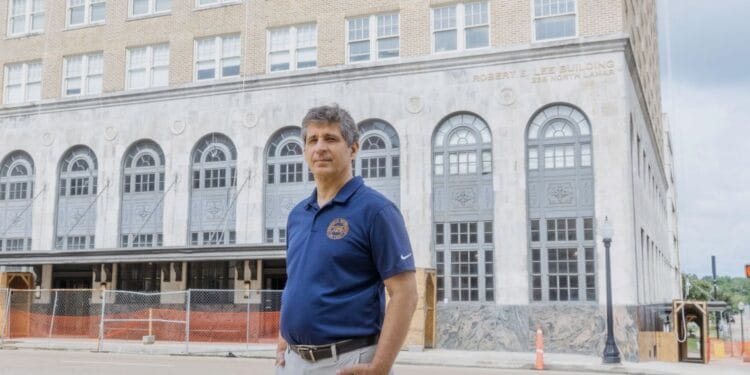Under the shadow of a rushed and unusually chaotic budget process last month, Mississippi legislators approved nearly $700,000 for a pilot program to help poor defendants in one of the state’s most rural areas get public defenders.
Mississippi lawmakers have long resisted reforming the state’s dysfunctional public defense system, which can often leave an indigent defendant in jail for weeks or months without access to a lawyer, a long-held Constitutional right.
Gov. Tate Reeves has until June 19 to sign the funding bill, allow it to become law without signing, or veto it. The bill provides $668,000 for the Office of State Public Defender to set up the one-year test run.
State Public Defender André de Gruy said if the bill becomes law, the money will be used to hire three or four attorneys and support staff working in the seven counties of the state’s 5th Circuit Court District, located in north-central Mississippi. Those new attorneys would work alongside lawyers already handling public defense in the district. He hopes the pilot program will be renewed next year and ultimately run for three years. The new state money would come in addition to what the counties in that court district are already spending on public defense.
A key goal will be to represent indigent felony clients beginning the day they are first charged, de Gruy said. That’s an area where public defense in Mississippi has long failed to meet national standards.
“The practice of early representation really doesn’t happen anywhere in Mississippi,” de Gruy said, speaking of defendants with court-appointed counsel.
At only a year’s worth of money, it’s a small step but still marks the most meaningful move from the Legislature in years to improve the state’s patchwork public defense system. If the bill becomes law, it will be the first time any state money has gone toward non-death-penalty cases in local trial courts outside Hinds County.
During state Senate debate, Sen. Brice Wiggins, a Gulf Coast-area Republican who shepherded the funding bill, described the pilot program as a “way for us to start looking at a statewide public defender system.”
In Mississippi, public defense is largely left to a sprawling network of local courts and governments with no state resources or funding. There is also no monitoring or oversight of how local systems perform. A defendant facing felony charges can move through as many as three different courts, sometimes changing lawyers along the way or even going without a lawyer for key stretches of time.
Mississippi State Public Defender André de Gruy stands in front of his office in Jackson in May 2025.
The Office of State Public Defender, which de Gruy was appointed by the governor to lead, handles death penalty cases and appeals by indigent defendants following their original trials. The office also receives some money to help supplement the Hinds County Public Defender’s Office’s funding.
Otherwise, de Gruy’s office plays no role in representing local felony defendants.
Experts have estimated that as many as 80% of the state’s felony defendants are indigent. The percentage is likely higher in counties with high poverty rates.
“Mississippi has had the same problems for the 30 years I’ve been working on it,” said David Carroll, the founder and president of the Sixth Amendment Center, a Boston-based nonprofit think tank that focuses on the improvement of public defense across the country.
With only one year of funding for just one of the state’s 22 circuit court districts, it’s unclear whether the bill will chart the way toward statewide improvements.
Even as he’s “cheering this on,” Carroll said stronger commitments from the state are needed to turn a short-term program into a lasting reform effort.
He said effective systems can be built in a piecemeal fashion. He pointed to Kentucky and Georgia, which used incremental, county-by-county approaches to produce statewide changes.
The funding bill also comes amid increasing scrutiny of the state’s so-called “dead zone” — the time between the first appearance before a judge and an indictment by a grand jury, which can take months.
After their first appearance in court, indigent defendants were often unrepresented before indictment, even when jailed. Almost two years ago, the Mississippi Supreme Court banned this practice, at least on paper.
The high court ordered the lower courts to continuously provide a poor defendant with a lawyer.
However, the decentralized nature of public defense in Mississippi means that it’s been hard to determine whether the new rule is being followed.
Reporting by The Marshall Project, ProPublica and the Northeast Mississippi Daily Journal found that many courts did not initially have any plan about how to follow the new rule. After the news reports, a former state Supreme Court justice said much the same to a state House of Representatives committee in 2023.
The human toll can be significant. The Marshall Project previously reported that one man spent about a year and a half in jail on a drug charge with no lawyer before a judge assigned him an attorney and ordered him released. In another county, a local judge forced a woman to represent herself during a key court hearing even after she asked for appointed counsel. She ultimately testified on her behalf without an attorney’s assistance.
Solving this “day 1” problem will be a key goal for the pilot program, said de Gruy, the state public defender.
He’s been in talks for months with local officials of the state’s 5th Circuit Court District, including judges, law enforcement figures, and city and county officials. The counties in the 5th district are Attala, Carroll, Choctaw, Grenada, Montgomery, Webster and Winston. Several of these counties have high poverty rates, such as Winston, where U.S. Census data showed nearly 30% of residents living in poverty in 2023. The statewide poverty rate in 2023 was 18%.
Early representation can lead to a quicker resolution of a case, the preservation of evidence, identification of defendants who require mental health intervention, and lower costs for county jails, de Gruy said.
Wiggins, the senator, told lawmakers that an improved and effective public defense system “actually makes our courts run better.”
The proposed funding faced stiff questioning in the Senate, including from several senators who have been paid by counties to provide public defense work. Debate on the measure came during a chaotic two-day special session to pass a budget, and some lawmakers complained that they didn’t know enough about the pilot program de Gruy would oversee.
The funding for the rural public defender program might very well have been pulled had it not been attached to a larger bill brought up on a do-or-die vote. The Senate last year killed a bill that would have authorized the state public defender to establish statewide public defense standards for local officials to follow.
In designing the proposed pilot program, the Office of State Public Defense has partnered with the Deason Criminal Justice Reform Center, a research center housed at Southern Methodist University Law School in Texas. If the program funding is approved, Deason will also be involved in the operation and evaluation of the program.



























